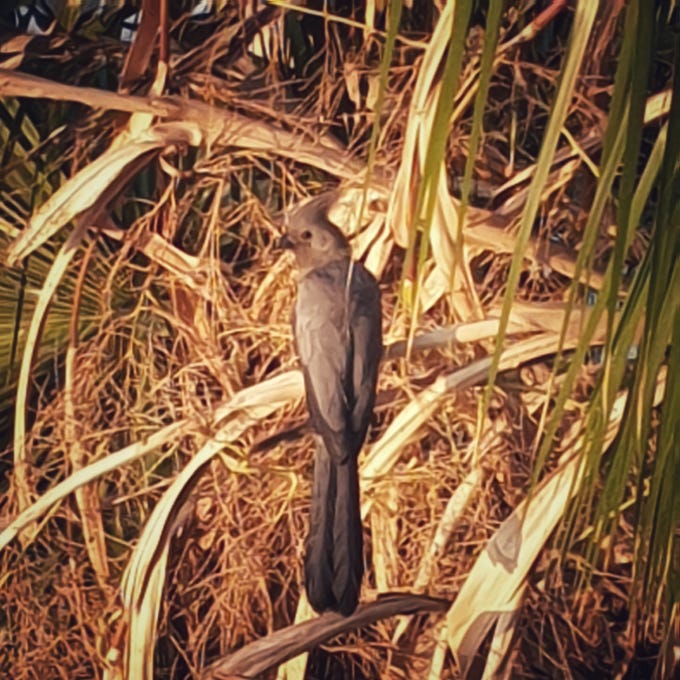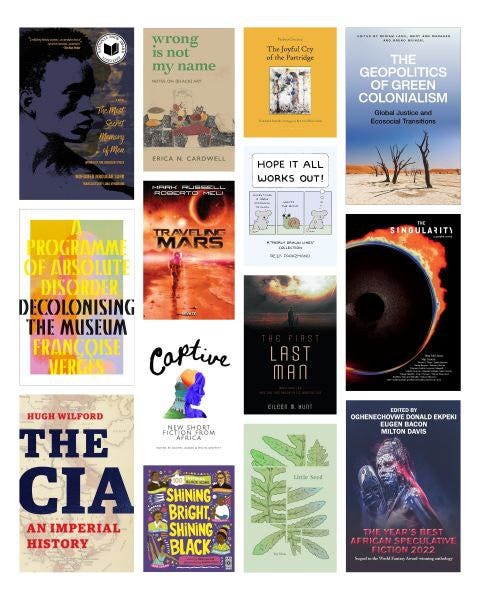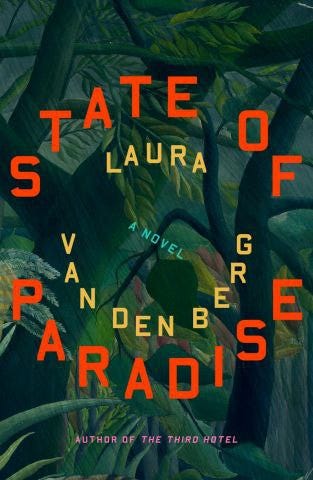Salutations!
It’s intensely hazy here; haven’t seen the horizon (which I get to see all the time) for a week or two now. Building up to good rains, hopefully, from September/October. But before that, my favourite season: haze, purple skies, all of the flowering trees flowering. (But rainy season is also my fave.)
Here’s a lucky not-a-fancy-phone-camera shot of umguwe/the grey lourie/grey loerie/grey go-away-bird that I saw this morning. They have the best call, really rather silly and petulant-sounding, especially when you consider their size—which always surprises me. They’re a type of turaco, like my sister’s fave (which we also see around here a lot—more than the grey, actually), the purple-crested turaco.
Some of the books I’m currently (slowly) reading
Recently on the blog
If you'd like to support my work, or to buy or preorder a book I’ve recommended—including the ones below, please do so on Bookshop here: https://bookshop.org/shop/hrb
My novel of the year!
This is by far my favourite novel this year; I don’t think anything else I read will be as sublime, or ineffable. I’ve read Dane’s SF before—he has a very nice trilogy, Cry Pilot—but this is something completely different.
It’s after the end of the world—for humans, that is, but nature is healing. “Modern civilisation” has broken down, people have retreated to villages again; they live in small communities that they created after the end, little enclaves of mutual aid and co-operation. But there are other not-quite-people who roam the land with different motives, and The RagPicker is one of them. [More]
Dreamy, lush, surreal in all of the best ways: State of Paradise is the book I couldn’t stop reading this week. Strange storms (which, you know, Florida). Sinkholes. Ghosts. Time at an in-patient treatment centre—which might feel gratuitous in a novel of this nature, but is really not. A “relatively benign” cult. Cats—so very many cats. Also a wolf or two. Events that are, well, pretty mundane, but that manage to make the hairs on the back of your neck rise. [More]
Gary is a mutant man-fish who lives at the bottom of, and sometimes on the shore of, a radioactive lake. Blank is the robot who was sent from the future to stop climate change, but Gary hit him over the head and he lost his memory (poor design, honestly, future people). Dr Elliott Williams is the genius who wants to study Gary and also do great things. This book is about how they come to meet and become friends, and then also all of their adventures, from dealing with aliens to questions of settler colonialism. Also, Gary’s love interest, and occasional offspring (not the same thing, don’t worry). [More]
Not only that, but it turns out, as I learnt from this book, Audubon also invented at least one bird, the Washington Eagle or Bird of Washington, and also misidentified many, many others in the course of his explorations. So, this is a portrayal of a man who did great work on the North American continent, but who turned out to be, as we all are in the end, flawed… [More]
I finally finished this one this month—I’ve been reading it since February—and Reader, I have really complicated feelings about it. This book has really, really brutal sex scenes, and they’re very off-putting. I believe the writer meant for them to be, to make their point, but I found them so unsettling that I don’t think I could recommend the book. It’s a pity, because Kobby Ben Ben has lots to say about homophobia in Ghana—something so important and topical right now—and there’s so much advocacy in just telling these stories. So it leaves me feeling very torn, because I know readers like me would be just as put off by those scenes and miss the import of the rest of the message. [More]
It took me a while to get into this novel’s structure: alternating POVs of the two main characters, Fog and Car, who are recently divorced but who are still linked emotionally and also through a strange friend of Fog’s, named Frank. The story starts off as a kind of review of post-divorce life: the analysis, memories, regrets, self-justification to some degree even as you know you still love the other and still make room for them, etc. But things get otherworldly when Car sees Frank—or thinks she does—on the street, and spends a few days obsessively following (stalking) him before she approaches him. After that—well, Reader, your guess is as good as mine. [More]
I’m currently on a Lethem jag… Which is to say, I’ve read two new things from Lethem this year; this, and The Collapsing Frontier. I’m kind of glad I’m reading “around” Lethem before actually reading his regular fiction (I never have), because his brain is so interesting.
Cellophane Bricks is about the road Lethem didn’t travel (sort of); he’s the son of a visual artist, and was deeply immersed in the scene from toddlerhood. He even went to art school. But he branched off into using words as his expressive tool. Lethem didn’t actually leave the world of visual art at all; he’s lingered on the fringes, writing about and for the visual artworks his friends have continued to create… [More]
Short War explores the period around the eve of the overthrow of Allende, and then the fallout from that in the lives of a small group of people in the decades after. Gabriel, the expat teen, is the son of a self-assured American journalist who’s also a CIA asset in Santiago. Gabriel is left-leaning, partly because of his local friends. His family makes it out of Chile when the coup happens, but he leaves his high school girlfriend, Caro, behind, and she is caught up in the terror and turmoil that ensues. Decades later, Gabriel’s daughter Nina, unearths the secret and finds out what happened to Caro. [More]
Short story collections are a way for an author to show off their range, and this one does, with stories that lean SF, historical fiction, mystery, romance, and more. Hanjing Wang has a strong voice, and this is a good collection, a great way to pass the time. I will be looking forward to reading more from her. [More]
Happening in books
News
It would have been James Baldwin’s 100th birthday on August 2.
Did you know he was also one of Nigeria’s first post-Independence filmmakers?
The beautiful National Theatre in Iganmu, Surulere, has been named for him.
Neil Gaiman has had multiple allegations against him of sexual assault, which he denies.
On Alice Munro: The Alice Munro Festival of the Short Story, held annually in the writer’s native Huron County, Ontario, has expressed its “unequivocal support” of Skinner as it weighs how the revelations will impact programming. Western University, where Munro was a student and later writer-in-residence and which now hosts an Alice Munro Chair in Creativity, said it’s considering “the impact of Alice Munro’s legacy and her ties to Western.” In her birthplace of Wingham, Ontario, a representative of the Alice Munro Library declined to comment on how it’s dealing with the revelations. The mayor of Central Huron, Ontario, the municipality where she lived much of her life, told the Canadian Press he’d “consider” amending a monument to Munro if there were public outcry.
Charles Yu’s Interior Chinatown is getting adapted.
There’s a new book out about Dambudzo Marechera, from Brookes Poetry Centre.
Want to highlight Interliink Publishing, “the only Palestinian-owned US publisher.”
Michelle Obama’s next book will be a self-care workbook, and will be published by Crown, per The Root.
Nnedi Okorafor’s been inducted into the Seattle Museum of Pop Culture’s Science Fiction and Fantasy Hall of Fame, along with Nicola Griffith. Nnedi Okorafor, bestselling Nigerian American writer of Africanfuturist science fiction and fantasy for both children and adults. Best known for her Binti Series and the novels Who Fears Death, Zahrah the Windseeker, Akata Witch, and Remote Control, she has also written for comics and film and is the recipient of numerous awards including the Hugo Award, Nebula Award, Eisner Award, and World Fantasy Award. I loved Nicola Griffith’s *Ammonite.*
Lewis H. Lapham, founder of Lapham’s Quarterly, died in Italy.
hmmmm the Hugo Awards again. Says Gautam Bhatia: The basic problem, of course, is that the Hugo voting process is the starkest example of the SF industry being embedded within capitalist social relations (can you think of anything more capitalistic than “pay-to-vote”?), which is in deep conflict with contemporary SF’s curated self-image. This leads to a strange situation, where WorldCon disqualifies votes that reflect nothing other than taking the Hugo voting process to its logical end-point: the one who has the most money, wins.
My friend Kate has a long-standing, wonderful programme getting books out to rural Zimbabwe. She doesn’t broadcast it, but she’s done—and continues to do—amazing work ❤️
Dr Tsitsi Jaji has published a chapter on Shona oral poetry, Decolonizing the Poem, in The Cambridge Companion to the Poem.
The Sauúti Collective has announced a new anthology, Sauúti Terrors: The Dark Side. More here.
Margaret Walker’s previously unpublished Goose Island is coming in 2025!
So’s Zora Neale Hurston’s previously unpublished The Life of Herod the Great, in January 2025. Afterlives!
The Royal Society of Literature has named 29 new fellows, including the wonderful Afua Hirsch.
Ouida Lagos, a cultural space in Ikeja, is coming along, and looks amazing.
Lev Grossman’s recent The Bright Sword is already set to be a series.
Viola Davis and James Patterson are set to collaborate.
Dr Chido Muchemwa’s Who Will Bury You and Other Stories is out in October from House of Anansi Press.
Events
Macondo Literary Festival’s 2024 theme is “The Sea is History”. The festival runs from September 20-22 this year in Nairobi.
Soma Nami Books’s African Book Fair is currently on, also in Nairobi, until August 11.
The Brooklyn Book Festival is always excellent (I’ve learnt so much!), and will be running from September 22-30. Virtual Day is Sept 22 this year; I encourage you to sign up!
The first-ever Sharjah Festival of African Literature will take place January 24-27, 2025, and Lola Shoneyin will be co-curator.
Prizes
Here’s the Caine Prize for African Writing 2024 shortlist! (On the website here.) On it: Tryphena Yeboah (Ghana), Samuel Kolawole (Nigeria), ‘Pemi Aguda (Nigeria), Uche Okonkwo (Nigeria) (I sense a theme), Nadia Davids (South Africa). Zimbabwe’s Yvette Lisa Ndlovu received an honourable mention. Very strong s/l this year! More here.
The Booker Prize longlist for 2024 is out. 13 books, including Wandering Stars, Wild Houses, This Strange Eventful History, Orbital, James (still reading lol), My Friends, and more. Noteworthy: 8 women and 5 men: the first Native American author to be l/l; three debut novelists and also an author of 20+ books; first Dutch author; four noms for publisher Jonathan Cape. Shortlist Sept 16, winner 12 November. (Also, the 2025 judging panel was announced.)
Alexis Wright won the2024 Miles Franklin Literary Award for Praiseworthy (her second win).
Martin MacInnes’s In Ascension won this year’s Arthur C. Clarke Award for Book of the Year.
The Center for Fiction has announced its 2024 First Novel Prize longlist of 25 books. The winner will be announced in December.
Check out the 2024 Commonwealth Short Story Prize shortlist here.
Here’s who’s shortlisted for the 2024 Ursula K Le Guin Prize for Fiction.
The University of Queensland Fiction Book Award finalists for 2024.
The 2024 Toyin Falola Prize shortlist has been announced, with five writers from Nigeria, South Africa, and Tanzania.
The 2024 Eisner Awards for graphic lit were announced at Comic Con.
Zimbabwean Simbarashe Steyn Kundizeza is this year’s winner of The Island Prize for Freelance. Ruby Excel (Ghana) and Mali Kambandu (Zambia) are the runners up.
Here’s the shortlist for the 2024 Forward Prize for Best Poetry Collection.
Jacana Media has announced that Lindani Mbunyuza-Memani is winner of the 2024 Dinaane Debut Fiction Awardfor her MS, *Buried in the Chest. (*Subs for 2025 open; see below.)
Craft and stuff
Here’s pittelsbookclub on Twitter/X sharing about the query letter that got them lots of things.
Here’s Will Dean sharing what he’s learnt about writing and publishing.
Interesting stuff
There's something special about hearing a writer on their work. Here’s Ayşegül Savaş.
From Lithub: How to pick the perfect book to read on a plane.
Coffee, Booze, Undressing, Deprivation: How Writers Get in the Mood to Write.
The Paris Review: On Joanna Russ and burying your gays.
14 books by Arab women for Women in Translation month, from Arablit.
Evergreen: The interview with Samuel Beckett when he won the Nobel Prize for literature.
In response to that NYT list: here’s a list of 100 Indie books. Here’s another one from The Bookshop Inc. The New York Times’“Best Books of the Century” List Was an Unforgivable Erasure of African Literature. (Podcast). (That NYT list increased book sales by huge amounts btw.)
A list of books by Palestinian authors by readbyuna on Twitter/X.
A thread of the most beautiful bookshops on Earth.
Silent book clubs are the jam I need, obvs.
Jobs, residencies, etc
Galleyway curates opportunities for BIPOC writers every month.
A new BA in African Literary and Cultural Studies in Germany.
The Paris Review is hiring a senior editor. Deadline August 18.
LOATAD’s Black Atlantic Residency 2025 applications close on August 18. More info here.
A residency programme to support Palestinian cultural producers; closes August 20 (my birthday, incidentally).
Submissions
Turkoslavia’s open for subs of prose and poetry translated from Turkic and Slavic languages. Closes Oct 1.
Apex Mag is open for fiction subs for previously unpublished writers, in August and September.
Feminist Press is open for subs until August 20 (my birthday, incidentally).
The Journal of African Youth Literature is open for all kinds of subs from Aug 1.
The Editors’ Prize from the Missouri Review is open for stuff. $25 entry fee. Winners get $5,000 and publication. Closes October 1.
The Safal Kiswahili Prize is open for subs until November 30, 2024.
Uncanny Mag wants your story subs, until September 2 (750-10,000 words).
What Brings You Here, a speculative travel anthology edited by Oghenechovwe Donald Ekpeki and Somto Ihezue and to be published by Solaris, is open for subs until 30 September.
khōréō Mag is open for short stories, translations, and flash fiction until August 15. They pay 10c a word.
Writers Space Foundation is open for lots until August 15.
Chill Subs: Where to submit this week.
Sundress Publications has an open call for an anthology of poetry by survivors of sexual assault. Closes September 30.
Submissions for Moss Puppy Mag’s Issue 7 are open until October 1. Moss Puppy Mag describes itself as a lit mag for the weird, muddy and messy.
Here’s a round-up of opportunities from the Journal of African Youth Lit.
India! Here’s an opportunity (paid) to submit to an SF anthology if you’re an Indian citizen. Deadline October 31.
Submit your MS to Jacana for the 2025 Dinaane Debut Fiction Award.
minor literatures is open for fiction, essay and experimental subs.
South 85 journal’s open for subs on the theme of “metamorphosis” until August 31.
Magic in the Melanin is a Black fantasy anthology coming February 2025, and subs are open.
Interpret Magazine, a magazine of international lit from Scotland, is open for subs until August 14.
Short Fiction Journal is open for subs until August 11.
The Bridport Prize Memoir Award is open until September 30. Judge: Lemn Sissay.
Fahmidan is open all year round for subs. They pay!
That's it for now. You can find me in all of the usual places: linktr.ee, on the blog, or by replying to this email. I’m also frequently at The Continent and The Sunday Long Read, talking books.
Take care!
J. 🌸💫
…[The] first thing a writer should be is—excited. He should be a thing of fevers and enthusiasms. - Ray Bradbury

















Well that's my TBR pile up another three or four books...